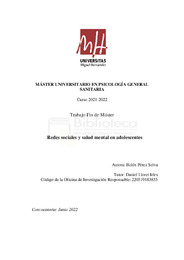Please use this identifier to cite or link to this item:
https://hdl.handle.net/11000/28898Full metadata record
| DC Field | Value | Language |
|---|---|---|
| dc.contributor.advisor | Lloret Irles, Daniel | - |
| dc.contributor.author | Pérez Selva, Belén | - |
| dc.contributor.other | Departamentos de la UMH::Psicología de la Salud | es_ES |
| dc.date.accessioned | 2023-02-10T09:10:01Z | - |
| dc.date.available | 2023-02-10T09:10:01Z | - |
| dc.date.created | 2022-05-24 | - |
| dc.identifier.uri | https://hdl.handle.net/11000/28898 | - |
| dc.description.abstract | Las redes sociales son un fenómeno que se ha expandido culturalmente y su uso entre la población adolescente está en aumento. Se trata de una herramienta que ha cambiado el modo de comunicarse, interactuar, socializar e incluso comportarse. Es por ello, que el objetivo general del presente trabajo trata de analizar el papel que desempeñan las redes sociales sobre la salud mental de la población adolescente de la Comunidad Valenciana. Participaron 4153 estudiantes con edades comprendidas entre 11 y 15 años de edad, siendo la media de edad de 12.59 años (D.T.= 0.788). La variable dependiente de este estudio fue la salud mental tomando para su medida los niveles de depresión, autoconcepto, comparación social y miedo a ser excluido (FoMO). Las variables independientes fueron la intensidad, la frecuencia y la severidad en el uso de redes sociales. Se encuentran relaciones significativas entre severidad en el uso de redes sociales y el miedo a ser excluido, y la comparación social tanto en chicos como chicas. Se hayan también relaciones significativas en el grupo de chicas entre las variables severidad y depresión, y entre frecuencia y autoconcepto. | es_ES |
| dc.description.abstract | Social media is a phenomenon that has expanded culturally and its use among teenage population is increasing. It is a tool that has changed the way we communicate, interact, socialize and even behave. For this reason, the general goal of this work is to analyze the role played by social media on the mental health of teenagers in the Valencian Community. A total of 4153 students aged from 11 to 15 participated in this study, the average age being 12.59 (S.D. = 0.788). The dependent variable of this study was mental health, measure by the levels of depression, self-concept, social comparision and fear of missing out (FoMO). The independent variables were the intensity, frequency and severity of social media use. Significant relationships are found between the severe use of social media, and fear of missing out, and social comparisons in both groups. There were also significant relationships in the girl´s group between the variables of severity and depression, and between frequency and self-concept. | es_ES |
| dc.format | application/pdf | es_ES |
| dc.format.extent | 33 | es_ES |
| dc.language.iso | spa | es_ES |
| dc.publisher | Universidad Miguel Hernández de Elche | es_ES |
| dc.rights | info:eu-repo/semantics/openAccess | es_ES |
| dc.rights.uri | http://creativecommons.org/licenses/by-nc-nd/4.0/ | * |
| dc.subject | redes sociales | es_ES |
| dc.subject | salud mental | es_ES |
| dc.subject | adolescentes | es_ES |
| dc.subject | severidad | es_ES |
| dc.subject.other | CDU::1 - Filosofía y psicología::159.9 - Psicología | es_ES |
| dc.title | Redes sociales y salud mental en adolescentes | es_ES |
| dc.type | info:eu-repo/semantics/masterThesis | es_ES |

View/Open:
PEREZ SELVA Belen TFM.pdf
728,72 kB
Adobe PDF
Share:
.png)
